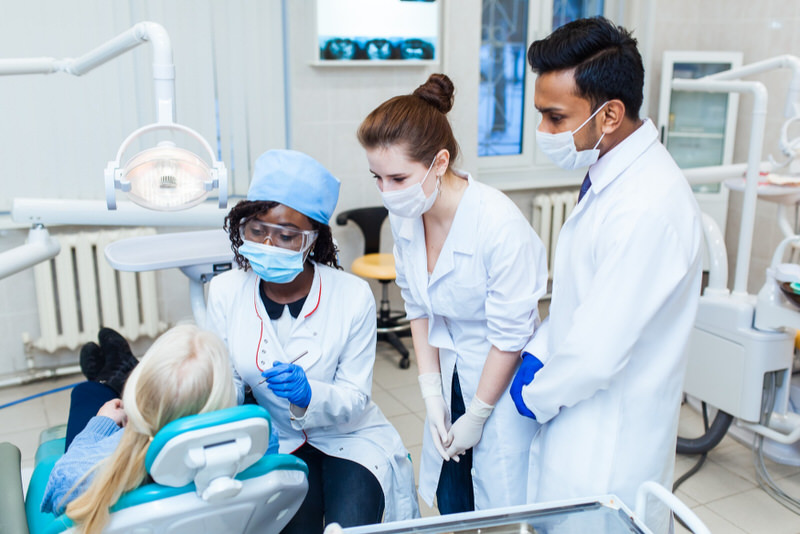For those who want affordable dental work done, different ways might be helpful. Dental schools, public dental clinics, free dental clinics such as non-profit and donated services, pro bono cases, government dental coverage, and dental savings plan are some of the few affordable or accessible ways to get the required dental work done. Other ways to cut costs include taking care of your dental hygiene daily, getting a yearly checkup, and talking to your dentist to reduce the services not needed. You can take various steps to keep your dental hygiene in check and adopt a healthy lifestyle to achieve it. It’s a significant step in making sure you won’t need expensive dental work in the future.
There’s no doubt that dental care costs are soaring high in America and the number one cause in why millions of people think twice before going to the dentist.
Even a routine checkup costs around $200, and on top of that, getting cavities filled or getting braces or dentures is even more expensive.
Those who can’t afford insurance suffer the most, and what it leads to is the neglect of dental hygiene.
One in 3 American adults lacks dental insurance. Every person deserves proper dental hygiene, but how can you get affordable dental care?
It shouldn’t be this hard, but there’re some options for affordable dental care that can help those looking for it.
Importance of dental work
Today, dental work and hygiene are viewed as a luxury that only rich people can afford. This is why it’s neglected by those who can’t afford it because they don’t deem it necessary.
Ignoring a toothache or cavity is something people have to do when they can’t afford dental work. But a happy and clean mouth is necessary to live a good life so you can chew your own food even when you’re old.
Taking care of your dental issues in the beginning will prevent the problem from becoming big and needing more money to fix it later on.
Regular cleaning helps the dentist identify the issue before it turns into a root canal or big cavity later on, which costs more money.
6 different ways to get affordable dental work
Even when people know the importance of dental hygiene and want to go for regular checkups, it’s not so easy to find affordable ways to get it done.
Not everyone can afford dental insurance, and even with insurance, sometimes only children below the age of 18 are included as essential for dental coverage.
In contrast, it’s not an essential health benefit for adults.
1) Dental schools

Dental schools have students in graduate programs who need experience before graduating.
Don’t worry, the students work under the supervision of licensed supervisors.
You can go to such schools and receive dental treatment from these students for half the price of whatever you want to get done.
They definitely treat at reduced prices. If you want fillings, root canals, or any other treatment which usually costs thousands of dollars, then this is a great option to choose.
The cost depends on the state-to-state school, and you can check here for a school in your state.
2) Public dental clinics
Another option is finding public dental clinics that charge low, fixed prices or sliding fees based on how much you can afford.
Depending on the clinic, they mainly offer exams, cleanings, X-rays, root canals, fillings, crowns, and surgical tooth extractions.
These are taxpayer-funded clinics run by local or state health departments or community health centers that get grants from the federal government.
A sliding fee refers to a flexible fee they might charge if you show them how much you can afford. Or sometimes there’re fixed lower prices depending on the public clinics near you.
3) Free dental clinics
This is another way to get the dental work you need to get done. But not all clinics might adhere to all age groups, and some only provide services to senior citizens and some only to children.
These are mostly charity-based or receive funds from professional dental organizations.
- Non-profit clinics – For those with low incomes, no insurance, or those who can’t afford insurance, non-profit clinics with volunteer dentists come to the rescue, and fees are based on your ability to pay. You can them listed on state or local directories of free or safety net dental clinics.
- Donated services – Some state or national charities use donated labor and material to provide free dental work. Dental lifeline operates in about 50 states and offers dental work for people over 65 and over, people with permanent disabilities, or severe medical conditions.
There’s a program for children from low-income families with volunteer orthodontists for braces and other treatments.
The mission of Mercy is a program run by America’s Dentists Care Foundation that hosts free two-day dental clinics at fairgrounds, high schools, and other places.
They usually don’t even require proof of income, and you can check the availability of dates on the website.
4) Pro bono cases
With their private clinics, some dentists also provide low-cost or free dental work for those who can’t afford to get dental work done.
These depend on the dentist and if they’re ready to offer their services to those who need them.
You can check private dentist clinics near your home and check their website if they have one, and they might have mentioned which days they provide their services for such.
They usually require proof, so you need to ask around a bit before you find a generous dentist who’s offering their services.
5) Government dental coverage
The government provides various programs that you can benefit from for your dental care and overall healthcare.
Medicaid is a program for people with low income, limited resources, or certain diseases or disabilities. Each state runs its own Medicaid program, and rules differ from state to state.
You can find what rules imply in your state on their website and see if applicable and what services you’ll be provided with. There are eligibility criteria, but the payment is set to the minimum.
If you’ve kids, they may be covered under a separate program called the Children’s Health Insurance Program (CHIP).
6) Dental savings plan
A dental savings plan depends on how much dental work you and your family get per year and how much you’re paying out of pocket.
Also known as dental discount plans, it’s very different from dental insurance, and it’s for those who can’t afford dental insurance or who want services that aren’t covered by insurance.
If you’re one single person, you might get a discount of 10 to 60 percent off services from dentists who are in the plan’s network.
You pay a yearly fee of about less than $150 for a family, and you don’t have to pay any additional amount to get the discount.
It’s beneficial for those who need dental work that can’t be covered by their dental insurance, where some cap out at less than $2000 per year. You can get it just a couple of days before you need to get dental work done.
Some companies provide it as part of their employee benefits package, or you can get it from groups or associations or major insurance companies.
Make sure to get a list of dentists who are part of this dental savings plan that you can get from the plan’s sponsor. Make sure you’re not getting conned over the call and buy the savings plan from an authentic and known sponsor.
Other ways to save money on dental care
Frequency of checkup
The number of times you need to go to a dentist depends on how well you want to maintain your dental hygiene or choose to go only when the situation has worsened.
The better option is to visit the dentist once a year to keep your teeth in check. You can avoid common ways to damage your teeth, which will become expensive to treat later.
Although dentists recommend visiting them twice a year, you don’t need to visit that frequently. It all greatly depends on how well you take care of your teeth and if you’re a non-smoker and generally healthy person.
This is how you prevent all sorts of issues like cavities, gum diseases, plaque, rotten teeth, and much more.
Limiting your visits can save you money if you’re tight on money.
Skipping services you don’t need
You can chat with your dentist and let them know about your financial issues and ask what’s necessary to get done and what’s not.
Of course, that doesn’t mean you should compromise on your dental care and not get what’s essential, but you can have a more open conversation about the treatment and steps needed.
Wisdom teeth
People think that their wisdom teeth need to be extracted whenever they appear, but that’s not true for everyone.
Wisdom teeth can only be removed if they cause significant pain or grow in a slanted direction, disrupting your jaw’s structure.
If the tooth isn’t causing any issues, you can live normally. In the end, it’s only expensive and unnecessary to get it removed.
Braces
Many teens want to get braces because they just want their teeth to be more aligned, making the overall appearance better.
If you can’t get any program or charitable programs to get braces for your child, you don’t need to get them done.
Braces are only necessary when the teeth are causing issues such as overbite, which creates problems in day-to-day functions.
You can talk to your dentist about the best option financially for your family.
Avoiding dental care by keeping teeth healthy

Most importantly, you can significantly reduce your trips to the dentist by taking care of your dental hygiene daily.
Not many expensive items are needed to ensure your teeth and gums are healthy, which can work as long-term protection for your teeth. Here are a few things you should do daily to achieve healthy teeth and gums.
Brushing twice a day
Thinking that brushing once a day is all you need couldn’t be more wrong. Our teeth need to be brushed every 12 hours, making it twice a day.
Whatever we eat in a day gets accumulated in our teeth and gums even though it might appear clean to us in a mirror.
Brushing twice a day keeps the plaque from accumulating and prevents gum disease.
Brushing before bed makes sure all the food eaten during the day is removed, and you’ll notice a change in your breath after waking up too.
Brushing properly
You need to not just brush twice a day but brush properly.
Every part of the teeth needs to be cleaned thoroughly, and you should make sure you buy decent toothpaste and have a good brush.
There’re different kinds of brushes in the market with soft, medium, and hard strength bristles.
Different types of movements are required while brushing to get into the pesky corner of the mouth too. If you aren’t sure how to brush correctly, make sure to watch a video and learn from it.
Fluoride toothpaste
There’re different kinds of toothpaste available in the market.
Go for one which contains fluoride in it. It helps fight tooth decay and keeps germs from accumulating in our mouths.
Mouthwash
Mouthwash is another practical step in dental hygiene that is to be done right after brushing. Though many people ignore this step, mouthwash helps maintain a balance of the mouth and reduces the acid amount affecting teeth.
Flossing
Flossing is a great way to remove things that might be stuck between two teeth.
Sometimes you’re not aware, but food could get between your teeth which then secretly starts eating away your teeth and develops into a cavity.
Flossing is a great way to make sure that even the smallest gap between your teeth is cleaned.
Things you eat
Keeping healthy eating practices is good for several reasons. Even if you love sweets, you need to make sure that you brush thoroughly after anything that could damage your teeth considerably.
Never go to bed just after eating something sweet without brushing. Even if you eat something that sticks to your teeth, just clean it properly.
Avoid smoking and alcohol
Smoking and drinking alcohol can have many adverse effects on your dental hygiene and can cause mouth cancer, they can erode your teeth enamel and lead to gum diseases.
If you want your teeth to sustain, give up on this lousy lifestyle at once.
FAQs
How can I fix my teeth with no money?
There’re various ways to get the desired dental work done. You can visit your nearest public clinic where you can get work done for a low fixed cost.
You can choose to visit a dental school nearby and get work done by dental students who perform work at a significantly reduced price under the supervision of a licensed professional.
Or you can depend on a government dental plan or get a dental savings plan.
Can the ER pull your teeth?
Other than a licensed dentist, no other doctor or healthcare professional can do any dental work.
Even if they do so, it’s illegal and can cause serious harm as they aren’t licensed professionals and can take the wrong step while working on your teeth.
Are dental grants real?
Dental Grants reduce the cost of dental work by a minimum of 25 to 30 percent, depending on your procedure.
The Dental Grants Program provides you with the opportunity to pay less for implants and essential and cosmetic dentistry services.
The program is funded by participating dentists, covering grants, advertising, and administrative costs.
You can pay for the rest in any mode you wish to do so, or you can check out their payment plan program.
Is the smile grant program legit?
The smile grant program promises to reduce the dental work cost by 20 to 50 percent based on the work required by the patient.
After filing a form, the patient is connected to the participating dentist in their area, who then provides initial consultation and X-ray at NO cost.
After that, the patient is connected to someone who can do the required dental work you need. No added extra cost is required to be paid.
What dental services are covered by medicare?
Medicare doesn’t cover most dental care, dental procedures, or supplies, like cleanings, fillings, tooth extractions, dentures, dental plates, or other dental devices.
Part A covers inpatient hospital stays, care in a skilled nursing facility, hospice care, and some home health care.
What dental services are covered by Medicaid?
States are required to provide dental benefits to children covered by Medicaid and the Children’s Health Insurance Program (CHIP), but states choose whether to offer dental benefits for adults.
For children, dental services must minimally include relief of pain and infections, restoration of teeth, and maintenance of dental health.
States have the flexibility to determine what dental benefits are provided to adults for Medicaid enrollees.
While most states offer at least emergency dental services for adults, less than half of the states currently provide comprehensive dental care.
There’re no minimum requirements for adult dental coverage under this dental insurance plan.
To summarize
There might be steps taken in that direction regarding overall healthcare, such as with the Affordable Care Act in place, which brought millions of Americans insurance coverage. But there’s significantly lesser attention on dental care and rising dental costs and steps taken in that direction.
For people who can’t seem to afford dental care, it’s only but a luxury to get any kind of dental work done and only go to the dentist when things become worse. But there’re a few ways that bring hope to those who wish to get dental work done at affordable prices.
Even though you might have to look into it, there’re public dental clinics, government plans, dental schools, free dental clinics, and some other ways to cut down your dental work cost significantly.
The important thing is to keep trying to make sure the dental issues are taken care of in the beginning to prevent them from developing into serious problems that might cost more.
So, from your end, strive to adopt healthy practices to keep good dental hygiene.


